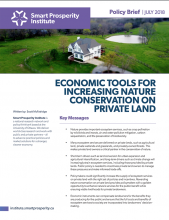July 20, 2019
Healthy ecosystems provide vital services to society at multiple scales, ranging from local to global. Private landowners want to steward and enhance these ecosystem services, but they need the right information and support, as well the appropriate incentives. This brief explores policy tools that can help protect these services for the public benefit while ensuring viable livelihoods for private landowners.
Key Messages:
- Nature provides important ecosystem services, such as crop pollination by wild birds and insects, air and water pollution mitigation, carbon sequestration, and the preservation of biodiversity.
- Many ecosystem services are delivered on private lands, such as agricultural land, private wetlands and grasslands, and privately-owned forests. This makes private land owners a critical partner in the conservation of nature.
- Short-term drivers such as land conversion for urban expansion and agricultural intensification, and long-term drivers such as climate change will increasingly strain ecosystem services, including those provided by private lands. Public policy is needed to incentivize private land owners to manage these pressures and make informed trade-offs.
- Policymakers could significantly increase the supply of ecosystem services on private land with the right set of policies and incentives. Rewarding nature conservation on private land provides policymakers with a golden opportunity to enhance nature’s services for the public benefit while ensuring viable livelihoods for private landowners.
- Economic instruments can compensate landowners for the benefits they are producing for the public and ensure that the full costs and benefits of ecosystem services to society are incorporated into landowners’ decision-making.
- The type of policy instrument to use for nature conservation on private land should be informed by the extent to which the chosen conservation measure generates public and private benefits. In particular, economic instruments should be used for practices which generate significant net benefits to the public, but which impose net costs to private landowners.
- There is a host of incentives that governments, environmental non-government organizations (ENGOs) and private companies can harness to increase nature conservation on private land, including conservation easements, payment for ecosystem service schemes, and tax incentives. We review some key examples from Canada and highlight lessons learned.
- Implications for policymakers include prioritizing the services and places with the potential for the highest impact, fostering collaboration among all parties to tackle shared priorities, obtaining better information on ecosystem functions, services and stakeholder preferences, selecting the appropriate tool for incentivizing ecosystem services delivery, implementing a critical mass of incentive schemes as experiments and learning-by-doing, and engaging in early outreach and support to build landowners’ trust.




